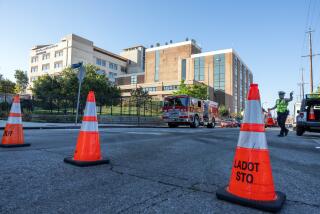County-USC Called Still Susceptible to Major Overcrowding : Medicine: Health director warns supervisors that a solution lies with measures being analyzed to determine their cost and feasibility.
- Share via
Los Angeles County-USC Medical Center remains susceptible to the severe overcrowding that led last month to 20 patients being left for hours on gurneys in a public hallway, the county’s health director has warned.
In a report to the Board of Supervisors, Robert Gates said he has ordered immediate steps to prevent patients from being shunted into hallways. But he said a solution to the medical center’s “serious overcrowding” depends on more comprehensive measures, currently being analyzed by top health officials to determine their cost and feasibility.
Gates also disputed the suggestion by several supervisors that the incident involving patients in the corridors Jan. 20 was staged by dissident doctors for a Times reporter.
“There is no evidence to indicate that this patient overload situation was intentionally caused or ‘staged’ to dramatize staff shortages and patient overload,” Gates wrote in his report. Rather, he said, the patients were part of an “unusually high volume of incoming emergency room patients” at General Hospital who later were moved into hallways when the medical admitting area became full.
Several of the patients appeared disoriented and were tied to their gurneys with thick leather wrist straps. Some were naked because their hospital gowns had slipped off. One man was seen by a reporter trying to slurp mouthfuls of food from a tray on his lap because his hands were tied down.
Harvey Kern, County-USC spokesman, said Wednesday the incident, which was deplored by top hospital officials and others, has not recurred.
The hospital has since used more private areas to hold patients admitted through the emergency room and awaiting beds on medicine units, Kern said.
In addition, the medical center has sought to reduce the number of psychiatric patients brought to General Hospital by police. Hospital officials have partly attributed the backup in the emergency and medical admitting areas to psychiatric patients taking up beds, even though General Hospital has no expertise to treat them.
General Hospital is the largest of four hospitals at the medical center, with an emergency department considered the busiest in the nation. County-USC has a small psychiatric hospital but it is almost always full. Overflow patients brought in by police have historically been sent to General Hospital.
The new policy forced by General Hospital’s overload, however, requires Psychiatric Hospital to take all police-escorted psychiatric patients, unless the patients also have medical or surgical problems.
While that has alleviated some of the load on General Hospital in recent weeks, medical center officials say it has created a crisis at Psychiatric Hospital.
On several nights last week, the admitting area at Psychiatric Hospital, designed for about eight patients, was jammed with 20, Kern said.
County health officials were able to transfer some of the patients to psychiatric units at other county hospitals, and to Metropolitan State Hospital in Norwalk.
But county officials stressed Wednesday that these are stopgap measures awaiting more permanent solution.
Among longer-range measures being considered to alleviate crowding at General Hospital is to open 24-hour “urgent care” clinics for minor medical problems at the county’s six comprehensive health centers.
County health and mental health officials are also conferring with private hospitals about the possibility of contracting for the care of psychiatric and other patients.
David Langness, spokesman for the Hospital Council of Southern California, said three private hospitals are reviewing proposals from the county: White Memorial Medical Center, California Medical Center and St. Vincent Medical Center.
Private hospitals in Los Angeles County are operating at about 50% capacity so space for these excess public patients is not the problem. Money is a problem, according to county officials, particularly in these times of scarce health care dollars. Gates is expected to present these proposals and their estimated costs to the Board of Supervisors by the end of the month.
More to Read
Sign up for Essential California
The most important California stories and recommendations in your inbox every morning.
You may occasionally receive promotional content from the Los Angeles Times.













